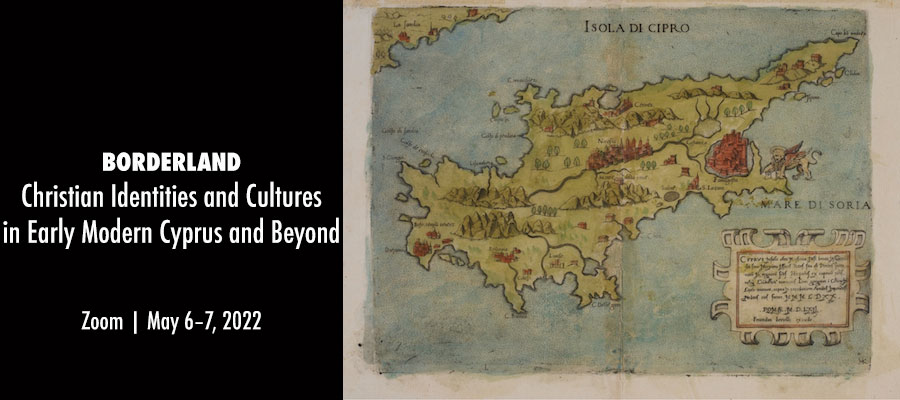Borderland: Christian Identities and Cultures in Early Modern Cyprus and Beyond, Zoom, May 6–7, 2022
The fifteenth, sixteenth and seventeenth centuries witnessed the emergence of new confessional identities throughout Europe as well as the re-negotiation and adaptation of earlier confessional self-perceptions. Over the past four decades, medieval and early modern Cyprus has attracted the attention of the international scholarly community as a geographically distinct zone of religious diversity. So far, research in the field covers aspects of identity formation, religious contention and conviviality as well as the construction of institutional, social and economic structures. Less attention has been paid, however, to the dynamics and mechanisms of Christian co-existence and strife in relation to religious culture. Equally important, yet largely unexplored, is the impact on Cypriot Christian self-perceptions and religious culture of major and broader developments in Europe (e.g., the Renaissance, Reformation and Counter-Reformation) and the Levant, at the time of the Ottoman expansion and the transformation of the post-Byzantine “Commonwealth”. Since Fredrik Barth’s work on the development, maintenance and negotiation of group boundaries (1969), scholars have been focusing on the relationship between identity and boundary construction, especially in multi-confessional and multi-ethnic societies. Although hardly impenetrable, boundaries ―physical/territorial and imaginary/psychological/spiritual― diachronically function as visible, audible, tangible and performed markers of religious and cultural perception and self-perception.
The aim of our conference is to address the status of Cyprus as a “borderland” or “frontier-zone”, already noted but not adequately investigated and analysed in historiography. In what ways were religious and cultural borders defined, constructed, negotiated, performed, and crossed in Cyprus between ca. 1500 and 1600? How can borders help us better understand Cypriot Christian identities (Orthodox, Latin, Maronite, Armenian, among others) and forms of cultural expression? Scholars from Britain, Cyprus, Germany, Ireland, Italy and the United States of America, who work on early modern multi-confessionalism and Cyprus from different disciplines and perspectives, and employ different sources, approaches and methodologies, will present papers and offer views and ideas on key themes related to the island’s religious geography and cultural physiognomy in this critical period.
